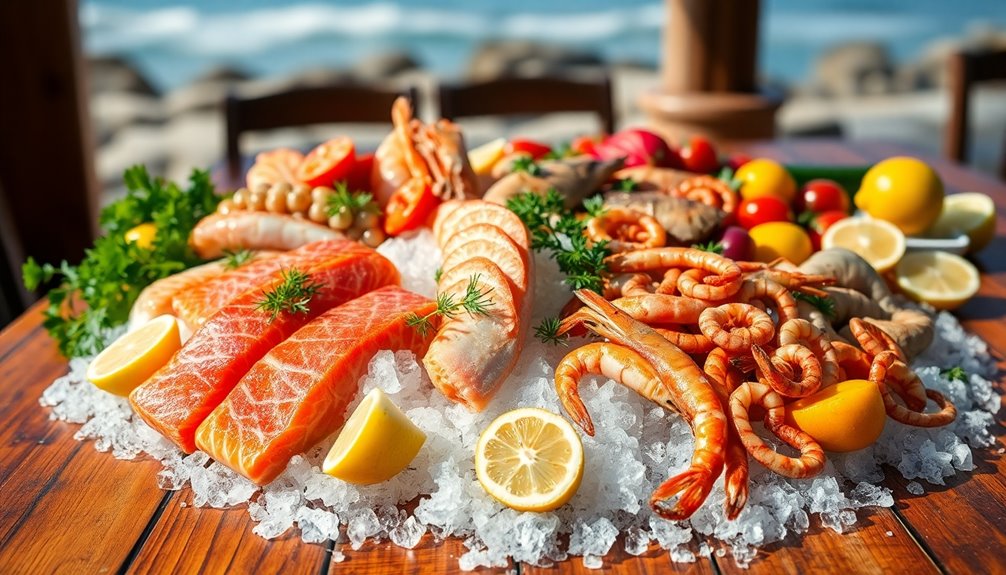A pescatarian diet combines the benefits of seafood with vegetarian principles. It emphasizes plant-based foods like fruits, vegetables, grains, and legumes while incorporating fish and shellfish. This approach provides essential omega-3 fatty acids, supporting heart health and reducing inflammation. Not only is it nutrient-dense, which aligns with weight loss goals, but it also promotes sustainable eating habits that benefit the environment. Incorporating varied proteins from both marine and plant sources can enhance culinary diversity in your meals. If you explore further, you'll uncover practical tips and tasty recipes for embracing this way of eating.
Key Takeaways
- A pescatarian diet combines vegetarian principles with seafood, focusing on plant-based foods and essential omega-3 fatty acids.
- It offers numerous health benefits, including heart health support, reduced inflammation, and weight management.
- Key food groups include seafood, legumes, nuts, seeds, fruits, vegetables, and whole grains.
- Transitioning involves meal planning, diversifying protein sources, and exploring local seafood options.
- This diet promotes sustainability, reducing environmental impact while providing a rich variety of nutrients.
What Is a Pescatarian Diet?
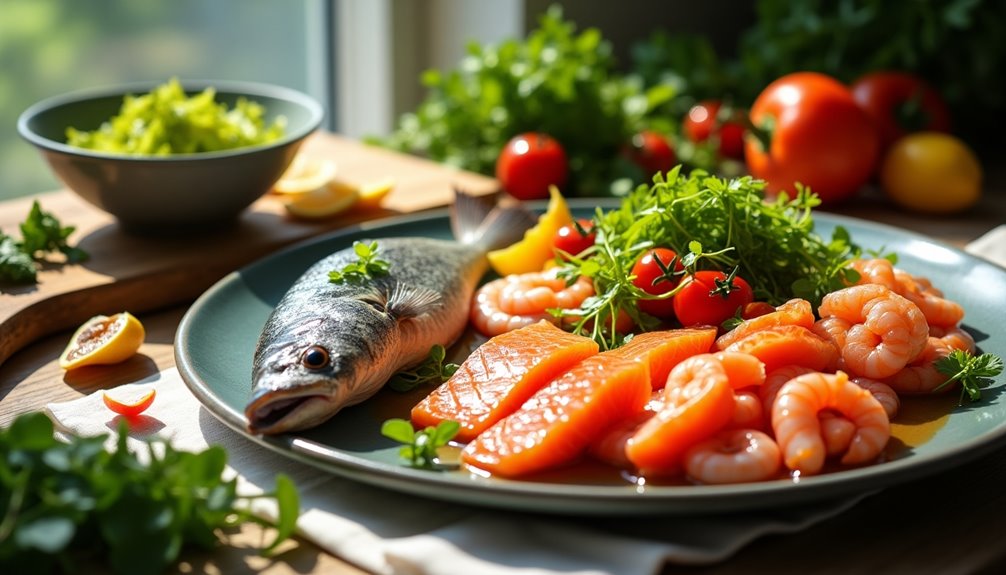
A pescatarian diet combines the principles of vegetarianism with the inclusion of seafood, creating a flexible eating pattern that emphasizes plant-based foods while allowing fish and other aquatic creatures. This approach not only caters to personal taste preferences but also provides a range of nutritional benefits.
For instance, seafood is rich in essential omega-3 fatty acids, which are crucial for heart health and brain function. By incorporating a variety of vegetables, fruits, grains, and legumes, you can ensure a well-rounded intake of vitamins, minerals, and fiber.
Moreover, adopting a pescatarian diet can positively impact the environment. Compared to a meat-heavy diet, consuming fish and plant-based foods typically requires fewer resources and results in lower greenhouse gas emissions. Many fish species are more sustainably sourced than land animals, making pescatarianism a more eco-conscious choice for those looking to reduce their environmental footprint. Additionally, incorporating more plant-based foods into your diet can further enhance health benefits such as lower cholesterol levels and improved heart health.
In addition to its health and environmental advantages, this dietary choice fosters a sense of community. You'll find that many restaurants and social gatherings offer seafood options, making it easier to share meals with friends and family. By embracing a pescatarian lifestyle, you're not only nourishing your body but also joining a growing movement of individuals who prioritize both personal health and the health of our planet.
Whether you're new to this way of eating or have been practicing it for some time, you'll find plenty of resources and support to help you thrive on a pescatarian diet.
Health Benefits of Pescatarian Eating
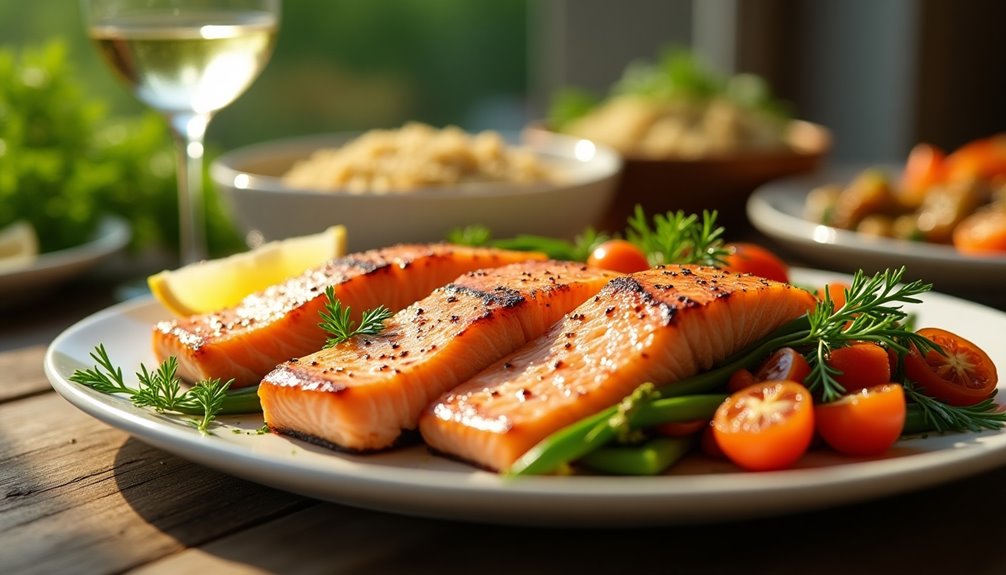
When you adopt a pescatarian diet, you discover numerous health benefits that can enhance your overall well-being. One of the standout advantages is the abundance of omega-3 fatty acids found in sustainable seafood. These essential fats are known to support heart health by reducing inflammation, lowering blood pressure, and decreasing the risk of heart disease. Incorporating fish like salmon, mackerel, and sardines into your meals can greatly boost your intake of these crucial nutrients.
Moreover, a pescatarian diet often aligns with weight loss goals. By focusing on seafood, fruits, vegetables, whole grains, and legumes, you naturally consume fewer calories while still feeling satisfied. This diet encourages you to choose nutrient-dense foods that are low in saturated fats, making it easier to maintain a healthy weight without feeling deprived.
Furthermore, the pescatarian lifestyle promotes sustainability. By choosing seafood from responsible sources, you not only benefit your health but also contribute to the health of our oceans. This connection can foster a sense of belonging to a community that values both personal and planetary well-being. Additionally, avoiding oxidized cholesterol through a balanced diet can further aid in maintaining optimal heart health.
In essence, by embracing a pescatarian diet, you're not just making a choice for yourself; you're also supporting your heart health, aiding in weight loss, and practicing sustainable eating habits. With these advantages, you can feel empowered and supported in your dietary journey, knowing you're making choices that positively impact both your health and the environment.
Key Food Groups to Include
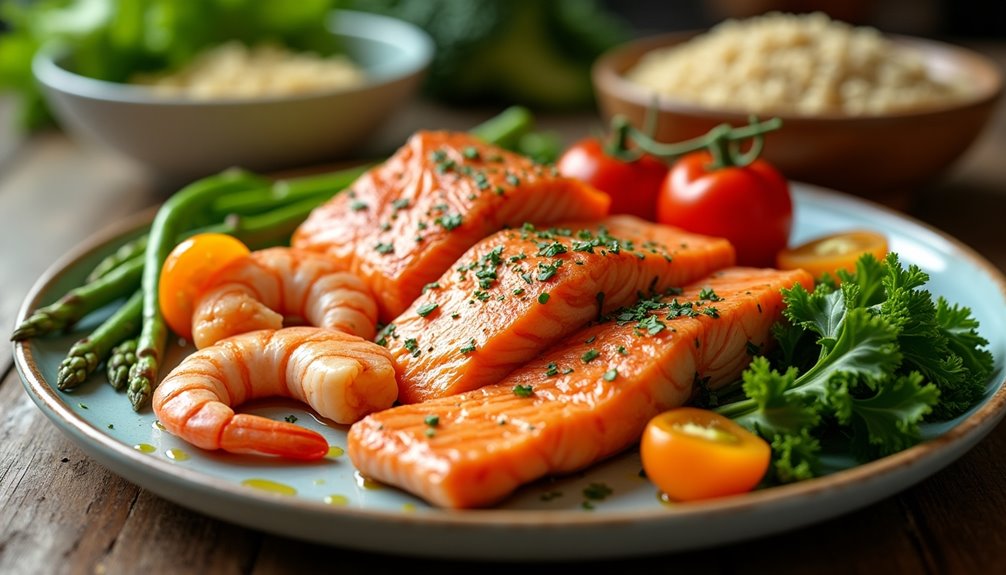
To reap the health benefits associated with a pescatarian diet, it's important to focus on key food groups that form the foundation of your meals. Incorporating a variety of seafood options is essential. Fish like salmon, sardines, and mackerel are rich in omega-3 fatty acids, which support heart health and brain function. Aim for at least two servings of fish each week to maximize these benefits.
In addition to seafood, you'll want to include plant-based proteins in your diet. Options like legumes, lentils, chickpeas, and quinoa not only provide essential amino acids but also contribute fiber, helping with digestion and keeping you feeling full. Nuts and seeds are excellent choices too, offering healthy fats and additional protein.
Don't forget about colorful fruits and vegetables! They're packed with vitamins, minerals, and antioxidants, which help boost your immune system and overall health. Try to fill half your plate with these vibrant foods at each meal.
Whole grains, such as brown rice, barley, and whole-wheat bread, should also be staples in your pantry, providing sustained energy and important nutrients. Additionally, including whole food sources of protein in your meals can further enhance your nutrient intake and promote overall well-being.
Tips for Transitioning to Pescatarian
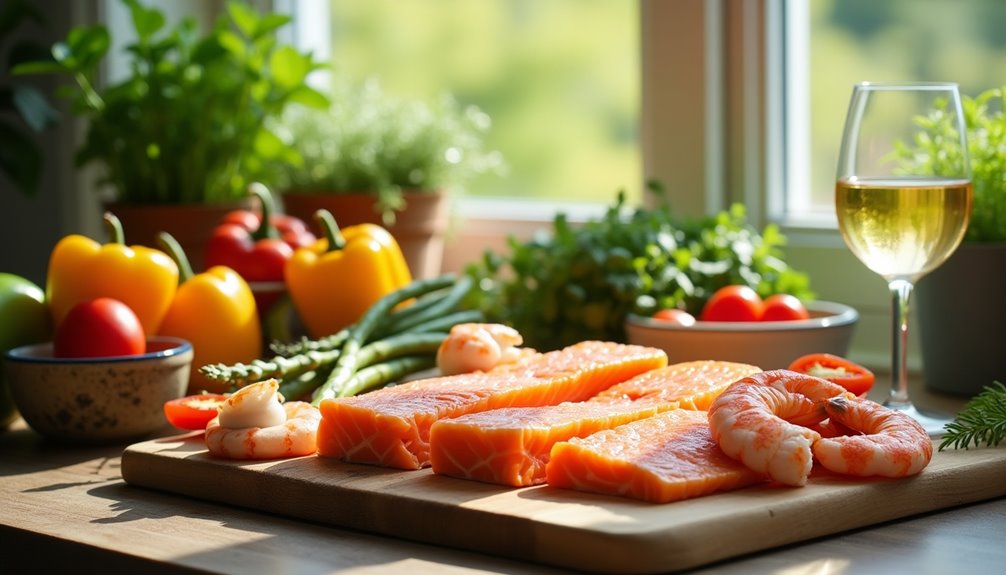
Shifting to a pescatarian diet can be a rewarding experience, especially with a few strategic methods. Start by incorporating meal planning into your routine. This not only helps you stay organized but also guarantees you have a variety of meals that include delicious fish and seafood. Aim for a mix of protein sources, such as salmon, shrimp, and plant-based options like beans and lentils. By diversifying your meals, you can enjoy the benefits of both marine and plant proteins.
Next, gradually replace your usual protein sources with pescatarian-friendly options. If you're used to eating chicken or beef, consider swapping them for fish and seafood. You might find that trying different cooking techniques, like grilling or baking, brings out new flavors and textures that you'll love.
Don't hesitate to explore local markets or specialty stores for fresh seafood; this can be a fun way to discover new ingredients while supporting your community. Additionally, consider joining online support communities that can provide you with helpful resources and encouragement during your transition.
As you make the shift, it's crucial to listen to your body. Pay attention to how you feel after meals and adjust your choices accordingly. You might even find it helpful to join online communities or local groups focused on pescatarian diets. Sharing recipes and tips can make the transition smoother and more enjoyable.
Common Misconceptions
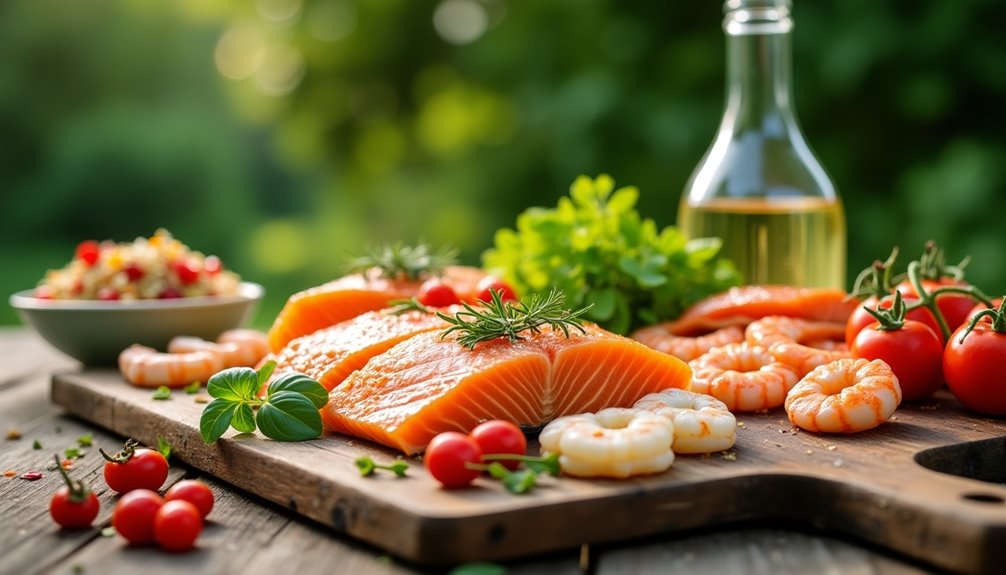
Many people hold misconceptions about the pescatarian diet, often thinking it's too restrictive or lacking in variety. In reality, this way of eating offers a diverse array of protein sources beyond just fish. You can enjoy a wide selection of seafood, legumes, nuts, seeds, and dairy products, providing ample opportunities to meet your nutritional needs while keeping meals interesting and flavorful.
Another common myth is that a pescatarian diet doesn't support environmental sustainability. While it's true that overfishing is a concern, many pescatarians consciously choose sustainable seafood options, helping to minimize their environmental impact. By selecting fish and shellfish from responsible sources, you can contribute to healthier ocean ecosystems while still enjoying the benefits of a pescatarian lifestyle.
Additionally, some people believe that pescatarians miss out on essential nutrients. However, this diet can provide all the necessary vitamins and minerals, especially when including a variety of fruits, vegetables, whole grains, and healthy fats. The inclusion of omega-3 fatty acids from fish can even offer heart health benefits that many land-based diets lack. In fact, many experts suggest that incorporating healthy fats from fish can support overall health and may even mitigate the negative effects of high-carb diets.
Ultimately, the pescatarian diet isn't just about restrictions; it's about embracing a balanced, health-conscious approach to eating. By challenging these misconceptions, you can feel more confident in your dietary choices and find belonging within a community that values both health and environmental stewardship.
Delicious Pescatarian Recipes
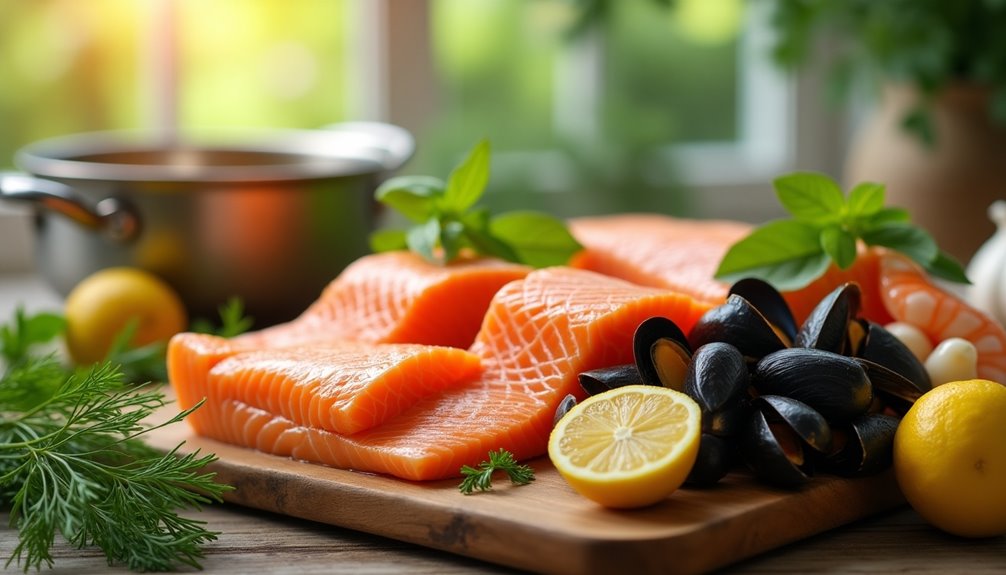
Exploring delicious pescatarian recipes can transform your meals into flavorful experiences that nourish your body and delight your taste buds. Embracing the seafood variety available means you'll have endless options to create vibrant and healthy dishes. Here are four delightful recipes you can try:
- Lemon Garlic Shrimp Pasta: Sauté shrimp in garlic, lemon juice, and olive oil, then toss it with whole-grain pasta and fresh spinach for a light yet satisfying meal.
- Grilled Salmon Tacos: Season salmon fillets with spices, grill them to perfection, and serve in corn tortillas with avocado and a zesty cabbage slaw for a fresh, fun twist.
- Mediterranean Quinoa Salad: Combine cooked quinoa, cherry tomatoes, cucumbers, olives, and feta cheese, drizzled with olive oil and lemon vinaigrette for a nutrient-packed side dish.
- Creamy Tomato Basil Seafood Risotto: Stir in shrimp and scallops to creamy risotto, enriched with tomatoes and fresh basil for a hearty and comforting dinner experience.
These flavorful dishes not only highlight the seafood variety but also invite your friends and family to join in the culinary adventure. You'll find that preparing these meals together fosters a sense of belonging, as you share the joy of nourishing your bodies with delicious and wholesome ingredients. By exploring pescatarian recipes, you're not just making dinner; you're creating memorable experiences around the table. Additionally, embracing natural calorie cycles while enjoying these meals can help you achieve a lean and healthy body.
Frequently Asked Questions
Can Children Safely Follow a Pescatarian Diet?
Yes, children can safely follow a pescatarian diet, but addressing growth concerns and meeting adequate nutrient intake is crucial. Focus on meal planning that incorporates a range of fish, vegetables, and whole grains to fulfill their nutritional requirements. Engaging the family in this process can improve dynamics and make meals more enjoyable. By emphasizing balanced nutrition, your child can flourish on this dietary choice while feeling included.
How Does a Pescatarian Diet Affect Athletic Performance?
Imagine you're a superhero, and your secret weapon is your diet. Eating fish can boost your athletic performance, thanks to the high-quality fish protein that aids muscle recovery.
Plus, the omega-3s found in fish help reduce inflammation and support endurance during intense workouts. By incorporating these nutrient-rich foods into your meals, you'll feel energized and ready to tackle any challenge, proving that what you eat can truly fuel your superhero journey.
Is It Necessary to Take Supplements on This Diet?
It's not strictly necessary to take supplements on this diet, but it can be beneficial. You might find that omega-3 sources, like fish and algae, help support heart and brain health.
However, you should also pay attention to your vitamin B12 levels, as they can drop without regular intake from fortified foods or supplements. Balancing these nutrients can help you feel your best and perform well, so consider what works for you.
Can a Pescatarian Diet Lead to Nutrient Deficiencies?
Think of your body as a well-tuned engine that needs the right fuel. A pescatarian diet can sometimes lead to nutrient deficiencies if you're not cautious. While fish provides essential omega-3 fatty acids, you might struggle with nutrient absorption of vitamins B12 and D, iron, and zinc. This can have health implications, impacting your energy levels and overall well-being. Balancing your meals with diverse foods helps guarantee you're fueling your engine effectively.
What Are the Environmental Impacts of a Pescatarian Diet?
When you consider the environmental impacts of your seafood consumption, it's essential to focus on sustainable fishing practices. By choosing seafood sourced responsibly, you support ocean conservation efforts and help maintain fish populations.
However, be mindful of mercury levels in certain fish, which can pose health risks. Balancing your choices not only benefits your health but also contributes to a healthier ocean ecosystem, fostering a sense of belonging to a community that cares.
Conclusion
Incorporating a pescatarian diet can be like adding a splash of color to a blank canvas; it enhances your meals and health alike. With its numerous benefits, including heart health and nutrient-rich options, this diet offers a flavorful yet balanced approach to eating. As you explore vibrant seafood and fresh vegetables, you'll likely discover new favorites. Embrace the change and enjoy the journey toward a healthier lifestyle, one delicious bite at a time.

